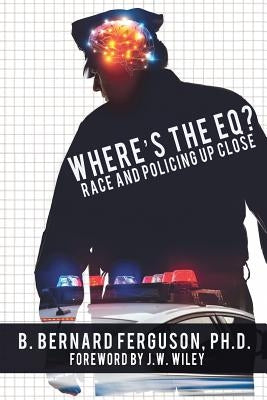Eq Perspective
Where's The EQ?: Race And Policing Up Close
Where's The EQ?: Race And Policing Up Close
Couldn't load pickup availability
Countless deaths of African Americans at the hands of police officers have sparked national debate surrounding the legitimacy of these killings and the current state of race relations in America. Emotional Intelligence (EQ) anchors this book and is used in assessing several of these types of encounters including what occurred with Michael Brown, Eric Garner, Sandra Bland, LaQuan McDonald, Tamir Rice, Alton Sterling, and Philando Castile, to show the role of EQ in deescalating volatile situations, and allow for assessing whether perhaps the presence of EQ during the above mentioned police encounters might have resulted in different outcomes. While racism is oftentimes cited as the sole reason why many of these types of encounters end badly, without ignoring the lingering effects of racism in our country, the book provides insight into how perceptions and biases are formed, and how they in turn, impact one's thinking. A compelling argument is then made as to how an individual's actions are oftentimes guided by their respective belief system, which primarily stems from all that we have been exposed to during our lifetime. The book articulates why there has to exist a double-standard when it comes to police officers, and while many officers hold the same values and beliefs as others within our society, because of the need for society to have trust in the law enforcement profession for it to be "effective", and the expectation that officers uphold their oath to "protect and to serve" the neighborhoods where they are assigned, they are not allowed the same discretion for "failure to perform" that a civilian might be afforded - nor should they. Finally, while acknowledging that there are far more "good" police officers who willingly lay their lives on the line to protect our freedom, the book addresses why it is incumbent upon police leaders to identify those officers who are either incapable or unwilling to perform their police duties in a manner worthy of public support, and to provide appropriate training, or separate if needed, such officers from the employment roles in order to protect the reputation of those police officers who truly want to make a positive difference in our society. To assist with better understanding the dynamics of the above mentioned "high-profile" encounters (and many others like them), EQ is used in constructing how a police officer possessing high levels of EQ might conduct themselves during an encounter with a civilian, for example, displaying EQ competencies to include self-awareness, self-management, social awareness, and relationship management. The results are then compared to what actually occurred during each of those events to allow readers an opportunity to assess where EQ was both present, and where it was absent during the encounter. What unfolds is that readers are challenged to assess their own perceptions, and are ultimately left with a broader understanding of what EQ is about, why it is important, and how it can be useful in not only in bridging the gap between police officers and local communities, but also for the purpose of enhancing understanding between everyday people.
Author: B. Bernard Ferguson
Publisher: Eq Perspective
Published: 10/13/2016
Pages: 350
Binding Type: Paperback
Weight: 1.03lbs
Size: 9.00h x 6.00w x 0.73d
ISBN: 9780997865196
About the Author
Ferguson, B. Bernard: - Dr. Bernard Ferguson earned a PhD in management with an emphasis in leadership and organizational change and focused his doctoral research on correlations between emotional intelligence and leadership effectiveness within police organizations. Joining the ranks of policing after growing up in the inner city of Los Angeles provided Dr. Ferguson with a unique perspective relative to interactions between police officers and civilians. During his early law enforcement career, he was assigned as a field agent responsible for investigating street crimes that at times required the engagement and apprehension of suspects tied to domestic and international gangs, narcotic distribution, and sometimes homicides. After being appointed to the executive ranks, Dr. Ferguson collaborated with other law enforcement officials to effect social change through the implementation of various initiatives and crime reduction strategies. After a 21-year career, Dr. Ferguson retired from federal law enforcement in 2014, and he now consults on matters pertaining to the application of EQ within organizations. Dr. Ferguson also teaches criminal justice courses at the collegiate level.
This title is not returnable
Share


